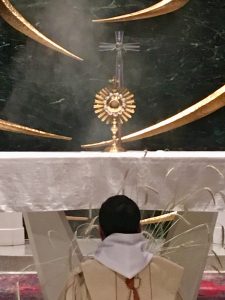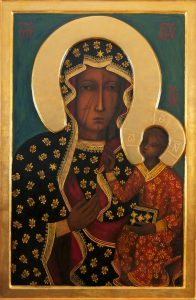 One of my loves is agriculture. Not many would have guessed it. This love has its roots in several places: family, church and the love of food and good health. Catholics and Orthodox Christians have a very long interest in being good stewards of land and water, animals, fish, fowl and agriculture. How we treat these things indicates how we think about ourselves. Neglect and abuse of the land ends badly for everybody. One of the things that I have keenly learned is that too many of have become so disconnected from the land and unconcerned with the quality of our food, the dignity of hard work and the recognition of what we have is given to us as a gift from God.
One of my loves is agriculture. Not many would have guessed it. This love has its roots in several places: family, church and the love of food and good health. Catholics and Orthodox Christians have a very long interest in being good stewards of land and water, animals, fish, fowl and agriculture. How we treat these things indicates how we think about ourselves. Neglect and abuse of the land ends badly for everybody. One of the things that I have keenly learned is that too many of have become so disconnected from the land and unconcerned with the quality of our food, the dignity of hard work and the recognition of what we have is given to us as a gift from God.
Benedict XVI reminded us in Caritas in Veritate:
It is necessary, then, to point in a truly unified way to a new balance between agriculture, industry and services, so that development be sustainable, and no one go without bread and work, and so that air and water and the other primary resources be preserved as universal goods (No. 27).
We need to look at some thinking and experience of farming that only begins to put some things together to as to understand work of faith and ecology. Let me propose “Restoring the Earth” some guiding ideas from Madonna House. We can also call it what Catherine Doherty called, Apostolic Farming.
Just as Pope John Paul gave us a superb theology of the body, we now need to connect that theology with a renewed and robust theology of creation. Many forget that we actually have a theology of creation! This proposal is one that needs to be echoed loudly that shows that farms and farmers incarnate in a particular way God in the world. And because of this fact, we need to be good stewards of the land because God gave us the land and natural resources. Farmers have a vocation that really mirrors the Order of Deacon: a way to serve and feed others.
 The St. Meinrad Oblates from the greater NYC area gathered as you know, for the 78th annual retreat this past weekend. As part of our Spiritual Exercises we have a Eucharistic Holy Hour. This year we prayed during this time for the Church which is currently in crisis as the consequence of clergy sexual abuse and cover-up, for the victims and victimizers.
The St. Meinrad Oblates from the greater NYC area gathered as you know, for the 78th annual retreat this past weekend. As part of our Spiritual Exercises we have a Eucharistic Holy Hour. This year we prayed during this time for the Church which is currently in crisis as the consequence of clergy sexual abuse and cover-up, for the victims and victimizers.




